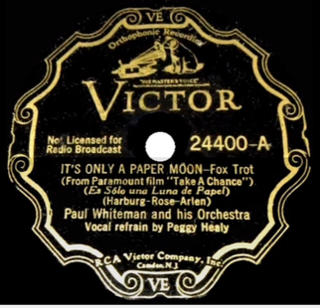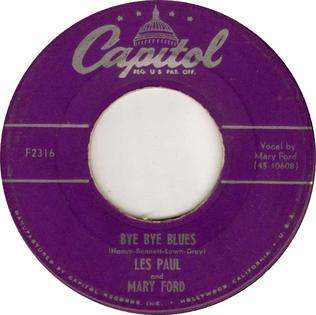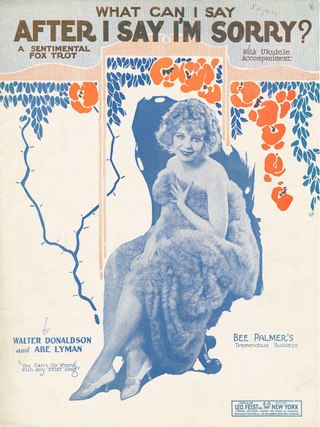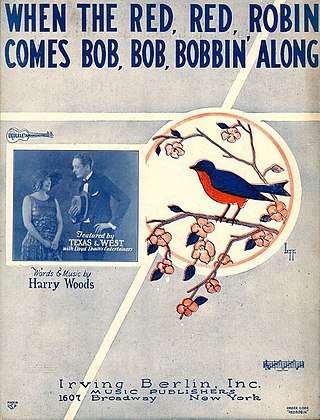When My Baby Smiles at Me is the name of a popular song with music by Bill Munro and words by Andrew B. Sterling and Ted Lewis, that was published by Harry Von Tilzer Music Publishing in 1920. It was interpolated into the Broadway show The Greenwich Village Follies (1919) and was the first big hit for clarinettist, vocalist and comedian Ted Lewis (1892–1971). Ted Lewis's jazz band recording in 1920 for Columbia Records, became his signature tune, and spent 18 weeks on the charts. Ted Lewis re-recorded it several times over the years and his 1938 version for Decca also charted briefly. The tune was also covered by other artists of the time.

"Stardust" is a 1927 song composed by Hoagy Carmichael, with lyrics later added by Mitchell Parish. It has been recorded as an instrumental or vocal track over 1,500 times. Carmichael developed a taste for jazz while attending Indiana University. He formed his own band and played at local events in Indiana and Ohio. Following his graduation, Carmichael moved to Florida to work for a law firm. He left the law sector and returned to Indiana, after learning of the success of one of his compositions. In 1927, after leaving a local university hangout, Carmichael started to whistle a tune that he later developed further. When composing the song, he was inspired by the end of one of his love affairs, and on the suggestion of a university classmate, he decided on its title. The same year, Carmichael recorded an instrumental version of the song for Gennett Records.
"In a Sentimental Mood" is a jazz composition by Duke Ellington. He composed the piece in 1935 and recorded it with his orchestra during the same year. Lyrics were written by Manny Kurtz; Ellington's manager Irving Mills gave himself a percentage of the publishing, so the song was credited to all three. Other popular versions in 1935/36 were by Benny Goodman and by Mills Blue Rhythm Band. The opening notes of the song's melody resemble Gershwin's "Someone To Watch Over Me".
"My Dreams Are Getting Better All the Time" is a 1945 popular song.
"A Hundred Years from Today" is a popular song published in 1933 with music by Victor Young and lyrics by Ned Washington and Joe Young. The song was included in the London production of Lew Leslie's Blackbirds of 1934.
"Just a Gigolo" is a popular song, adapted by Irving Caesar into English in 1929 from the Austrian tango "Schöner Gigolo, armer Gigolo", composed in 1928 in Vienna by Leonello Casucci to lyrics written in 1924 by Julius Brammer.

"It's Only a Paper Moon" is a popular song published in 1933 with music by Harold Arlen and lyrics by Yip Harburg and Billy Rose.
"Pennies from Heaven" is a 1936 American popular song with music by Arthur Johnston and lyrics by Johnny Burke. It was introduced by Bing Crosby with Georgie Stoll and his Orchestra in the 1936 film of the same name.
"Don't Take Your Love from Me" is a popular song written by Henry Nemo and published in 1941. Mildred Bailey first recorded this song in 1940 before publication. It was introduced that year by singer Joan Brooks.

"Five Foot Two, Eyes of Blue " is an American popular song that achieved its greatest popularity in the 1920s. As of January 1, 2021, the song has fallen into the public domain.

Bye Bye Blackbird is a live album by jazz musician John Coltrane recorded on November 19, 1962 at the Konserthuset in Stockholm and released in 1981 by Pablo Records.

"Why Was I Born?" is a 1929 song composed by Jerome Kern, with lyrics written by Oscar Hammerstein II.

"Bye Bye Blues" is an American popular and jazz standard written by Fred Hamm, Dave Bennett, Bert Lown, and Chauncey Gray and published in 1925.

"What Can I Say After I Say I'm Sorry?" is a popular song by Walter Donaldson and Abe Lyman, published in 1926.

"Wabash Blues", with words by Dave Ringle and music by Fred Meinken, was the first major success for pianist, saxophonist and song composer Isham Jones (1894–1956). Recorded in 1921 by Isham Jones and his Orchestra, this million-seller stayed twelve weeks in the U.S. charts, six at No. 1. Other popular recordings were by Benson Orchestra of Chicago, Dolly Kay, Ted Lewis (1930) and Russ Morgan (1939).

At Newport 1958 is a live album by the jazz musician Miles Davis featuring the Miles Davis Quintet's complete performance recorded at the Newport Jazz Festival in 1958. The album was first released as a single CD in 2001 though four tracks had previously been released in part as one side of the LP Miles & Monk at Newport. The entire concert was given its first complete release as part of The Complete Columbia Recordings of Miles Davis with John Coltrane box set in 1999, and all tracks were included on the 2015 compilation Miles Davis at Newport 1955-1975: The Bootleg Series Vol. 4.
"Baby Face" is a popular Tin Pan Alley jazz song. The music was written by Harry Akst, with lyrics by Benny Davis, and the song was published in 1926.

"When the Red, Red Robin " is a popular song written, both words and music, by Harry Woods in 1926. The song became the signature song for singer and actress Lillian Roth, who performed it often during the height of her musical career from the late 1920s to the late 1930s.
"Bye Bye Blackbird" is a song published in 1926 by the American composer Ray Henderson and lyricist Mort Dixon.

"Wang Wang Blues" is a 1920 jazz composition written by Henry Busse, Gussie Mueller, and Theron E. "Buster" Johnson, with lyrics by Leo Wood. The song was released as a 78 single by Paul Whiteman and his Orchestra featuring Henry Busse on trumpet. The song is a pop and jazz standard.












